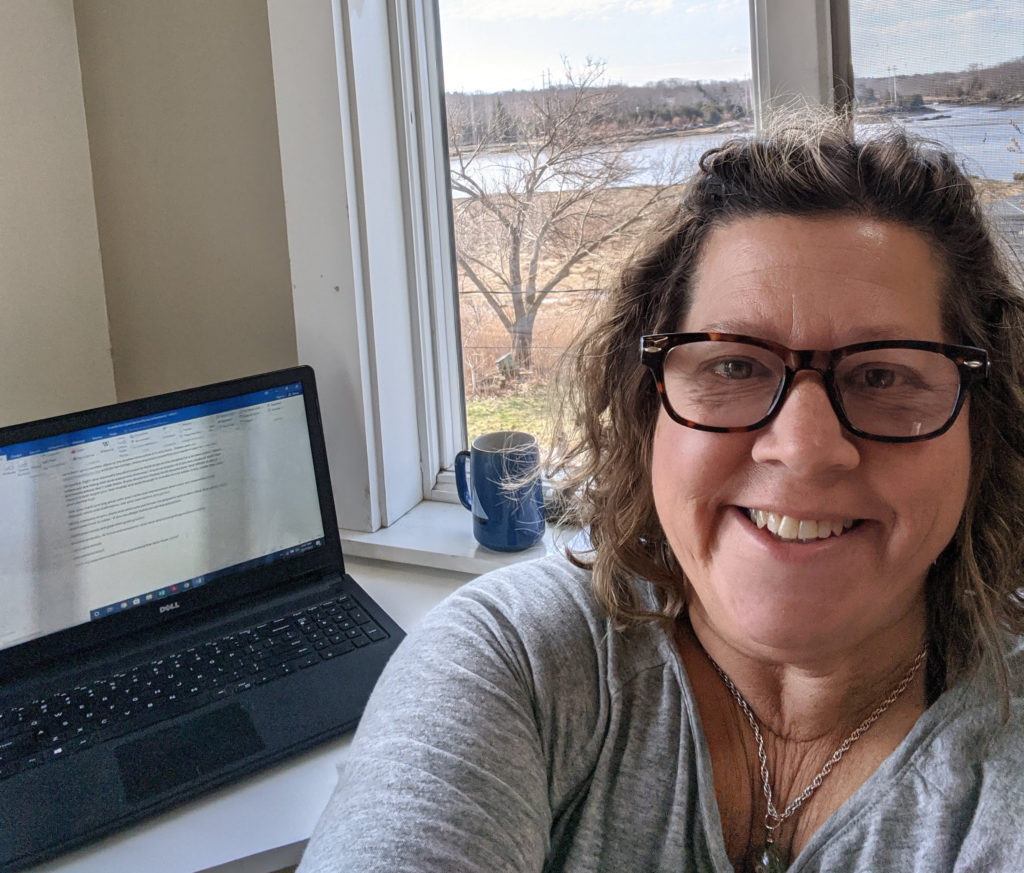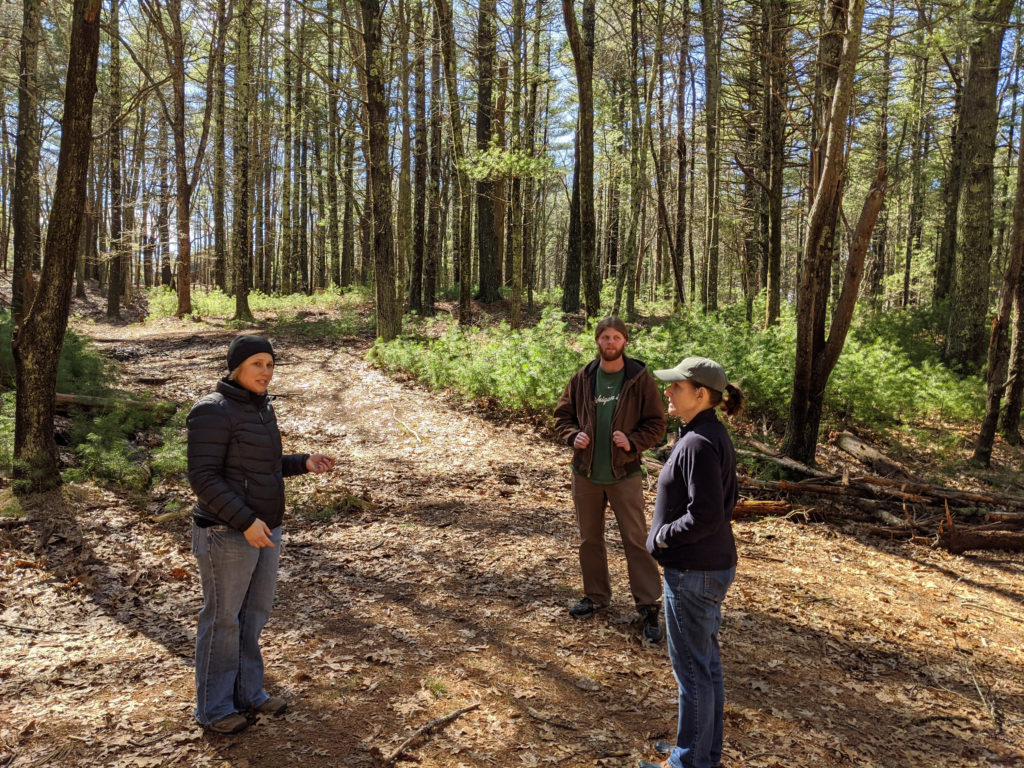 We are so grateful for the open spaces preserved on the South Shore so we can commune with nature while we endure social distancing during the pandemic. Just writing these words feels surreal. As you may know, the NSRWA is celebrating 50 years of protecting our waters here on the South Shore and a key tool for ensuring our water is clean, healthy, and life-giving is to preserve land that drains to it. We could not have imagined that the work we were doing, with our many partners, to preserve open space to save our water resources, would also be our saving grace during a pandemic. I am quite sure that in all the advocacy, grant writing or other furtive pleas we have made to preserve land – ensuring people had space to seek nature’s solace during a pandemic was not one of them!
We are so grateful for the open spaces preserved on the South Shore so we can commune with nature while we endure social distancing during the pandemic. Just writing these words feels surreal. As you may know, the NSRWA is celebrating 50 years of protecting our waters here on the South Shore and a key tool for ensuring our water is clean, healthy, and life-giving is to preserve land that drains to it. We could not have imagined that the work we were doing, with our many partners, to preserve open space to save our water resources, would also be our saving grace during a pandemic. I am quite sure that in all the advocacy, grant writing or other furtive pleas we have made to preserve land – ensuring people had space to seek nature’s solace during a pandemic was not one of them!
I have been thinking a lot about the people and organizations that I have worked with to help preserve land over the last 20 years and thought while you take that next hike you might want to know a little about how it happens. No two land acquisitions are the same, but key to it are willing landowners. You can’t acquire land unless you have a willing landowner and often they need to sacrifice significant financial value to save it for open space. Oftentimes the preserves are named after these generous landowners. Next time you take a hike on a property say a little thank you to the landowner who decided to pursue the public good over personal profit and look up more about the property at our exploresouthshore.org website. Follow links to the current owners – land trusts or towns- oftentimes they will have a description of these landowners who sacrificed for us all.
The other essential piece needed is funding. In 2000 the state passed the Community Preservation Act or CPA. This allowed towns to assess a property tax surcharge of up to 3% that was dedicated to one of three areas important to preserving community character – preservation of open space, the creation of affordable housing and historic preservation. Upon local adoption, towns were able to obtain matching funds from the state. In the early 2000’s, the NSRWA and its strong membership advocated early on to pass CPA in local communities on the South Shore, enabling towns to have the funding needed to work with those willing landowners and to make improvements to provide parking and trails. Today 176 of the 351 communities in the state have passed CPA, and all of the towns on the South Shore. Statewide over 30,000 acres has been saved with almost 4,000 acres on the South Shore alone! Some of my favorites include the South River Park, Pratt Farm, John Little Conservation Area, Cuffee Hill and Black Bog Pond Conservation Area, and Forge Pond Park to name just a few. Without this financial backing, many properties we’re taking on hikes on today would not have been possible.
It also takes volunteers to sit on open space committees and conservation commissions, land trust and watershed association staff and volunteers, and the users of these properties to care about protecting, stewarding the open space after it becomes preserved. The land, trails and parking lots all need maintenance and stewardship, whether to remove invasive species, trail blaze, clear a trail of woodfall, build bridges over wetlands or just pick up dog waste and trash. Think about that while enjoying the beauty that surrounds you. It doesn’t just happen; it takes a community that cares.
Lastly, we want you to get outdoors and use local conservation spaces safely. Our colleagues at MassAudubon and Trustees have had to close their properties because they were being overcrowded. Please understand that they didn’t make that decision lightly, they closed them to keep you and your families safe as well as their own staff. Monitor their websites and ours for when their iconic properties are re-opened.
 Here are few great tips to stay safe and protect our open spaces:
Here are few great tips to stay safe and protect our open spaces:
- Respect all signage that indicates if trails or parks are closed.
- Practice social distancing while hiking by allowing 6 feet in between you and other hikers. If the parking lot is full – go to another place or try another time when it is less busy. Please visit our exploresouthshore.org website for listings. There are many properties you haven’t been to – try one!
- Be careful. Right now especially you don’t want to have to go to the hospital for a broken ankle. Watch where you are hiking and wear supportive footwear. It is mud season so if you are aware of trails that get muddy please don’t walk there. If you encounter muddy trails, despite your best efforts to avoid them, it is best to get your feet muddy and walk through it in order to avoid widening, eroding or creating new trails.
- Take your trash and dog poop with you! Parks and conservation areas may not have active trash disposal. Same with bathrooms, use your own before you go out.
- Notify someone of your plans and when you get home. Go prepared with water, food, and first aid kit. Don’t share your food or water. If you see illegal behavior call the authorities.
- Wash your hands and gear after getting home.
- Practice kindness. At home and outdoors.
Stay sane and enjoy getting outdoors safely,
Samantha
NATURE WATCH – NSRWA MARCH 2020 from Norwell Spotlight TV on Vimeo.
